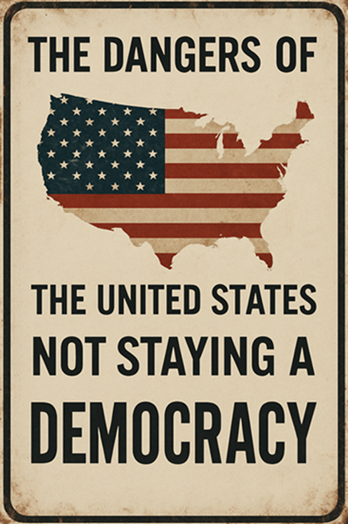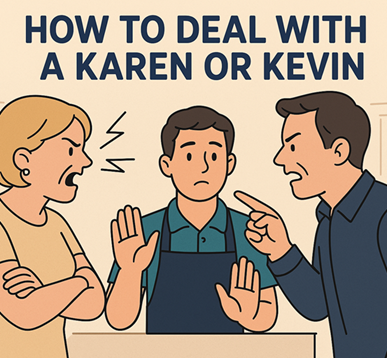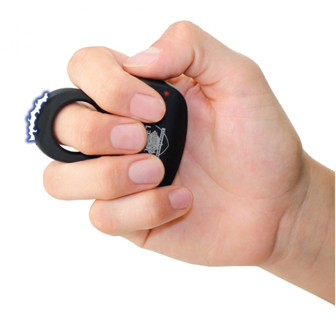How to Deal with a Karen or Kevin
 We've all seen viral videos or encountered them in real life—overly entitled individuals who cause unnecessary drama in public places. These people, often referred to as "Karens" (or "Kevins" for their male counterparts), are known for making unreasonable demands, escalating minor issues, and expecting special treatment. Whether it's in retail, customer service, or just everyday interactions, dealing with a Karen or Kevin can be frustrating and stressful.
We've all seen viral videos or encountered them in real life—overly entitled individuals who cause unnecessary drama in public places. These people, often referred to as "Karens" (or "Kevins" for their male counterparts), are known for making unreasonable demands, escalating minor issues, and expecting special treatment. Whether it's in retail, customer service, or just everyday interactions, dealing with a Karen or Kevin can be frustrating and stressful.
This guide will provide you with practical strategies to handle these situations effectively, maintain your composure, and ensure a peaceful resolution.
Understanding the Karen and Kevin Mentality
Before addressing how to deal with them, it's important to understand why some people act this way. Karens and Kevins often:
-
Feel entitled to special treatment.
-
Lack patience and empathy.
-
Believe rules don’t apply to them.
-
Use passive-aggressiveness or outright aggression to get their way.
-
Demand to "speak to the manager" when things don’t go as expected.
-
Feel justified in calling authorities over trivial matters.
While not every difficult person is a Karen or Kevin, these characteristics often define their behavior. Understanding this can help you strategize your response instead of reacting emotionally.
1. Stay Calm and Professional
The worst thing you can do when dealing with a Karen or Kevin is to match their energy. Instead of escalating the situation, try the following:
-
Take deep breaths to maintain composure.
-
Keep your voice steady and professional to prevent unnecessary escalation.
-
Use neutral language to avoid feeding into their aggression.
-
Avoid sarcasm or passive-aggressive responses, as this could worsen the situation.
A calm and collected demeanor can often disarm an angry person, reducing the intensity of the confrontation.
2. Set Boundaries Firmly but Respectfully
One key trait of Karens and Kevins is their tendency to push limits. Whether they are demanding an unreasonable refund, yelling at employees, or cutting in line, setting boundaries is crucial.
-
Clearly state policies (e.g., “Our store policy does not allow refunds without a receipt.”)
-
Use firm but polite language (e.g., “I understand your frustration, but yelling will not change the rules.”)
-
Remain consistent—if you bend the rules once, they will push harder next time.
3. Avoid Engaging in a Power Struggle
Karens and Kevins often thrive on confrontation. They want to "win" by getting the last word or proving their point. The best approach is to:
-
Listen without getting defensive.
-
Acknowledge their feelings without giving in to unreasonable demands.
-
Politely disengage if the conversation becomes unproductive.
For example, if a Karen keeps arguing, simply say, “I have explained our policy, and I won’t be discussing this further.”
4. Use Active Listening Techniques
Sometimes, a Karen or Kevin just wants to feel heard. If you work in customer service or public-facing roles, active listening can be an effective tool:
-
Paraphrase their concerns to show understanding (e.g., “So you’re upset because your food took longer than expected?”)
-
Use nonverbal cues like nodding and maintaining eye contact.
-
Ask clarifying questions to ensure you fully understand their issue.
Active listening can sometimes de-escalate a situation because the person feels acknowledged, even if you can’t fulfill their demands.
5. Know When to Walk Away
Not every battle is worth fighting. If a Karen or Kevin becomes verbally abusive, irrational, or refuses to listen, it may be best to disengage.
-
If you’re in a service role, calmly inform them that you cannot assist them further.
-
If you’re in a social setting, remove yourself from the conversation.
-
If they are being disruptive in public, do not escalate—let security or authorities handle it if necessary.
6. Handling Karens and Kevins in Online Spaces
With the rise of social media, Karens and Kevins have also taken their entitlement online. Whether it’s through bad reviews, negative social media posts, or hostile emails, dealing with them virtually requires a different approach.
-
Don’t engage in public arguments. Instead, respond professionally and offer to resolve issues privately.
-
Stick to facts. Avoid emotional responses and keep interactions factual and concise.
-
Use humor cautiously. While humor can de-escalate tension, it can also backfire if perceived as mocking.
-
Report and block abusive users if they cross the line into harassment.
7. When to Involve Authorities or Management
In some cases, a Karen or Kevin may become a genuine safety concern. If they:
-
Refuse to leave a business after being asked.
-
Make threats or behave aggressively.
-
Harass or endanger others.
Then it may be necessary to involve a supervisor, security, or the police. Always prioritize safety over engagement.
8. Maintaining Your Mental Well-being
Dealing with difficult people can be mentally draining. To protect your own well-being:
-
Vent to a trusted friend after a tough encounter.
-
Practice self-care (meditation, exercise, hobbies) to relieve stress.
-
Remind yourself that their behavior is about them, not you.
Taking care of your mental health ensures that one negative encounter doesn’t ruin your entire day.
Conclusion
Karens and Kevins are an inevitable part of life, but how you respond to them makes all the difference. By staying calm, setting boundaries, and knowing when to walk away, you can effectively handle these interactions without unnecessary stress.
Whether you work in customer service, deal with difficult neighbors, or encounter these individuals online, using the strategies outlined in this guide will help you navigate their entitled behavior while maintaining your composure. At the end of the day, you can’t change a Karen or Kevin—but you can control how you respond to them.
Company Info
Customer Service
Product Information
- TASER® and Stun Devices Regulations by State
- TASER® Safe Escape Product Replacement Guarantee
- TASER® Comparison Chart
- TASER® User Manuals
- TASER® Warranty Info
- Byrna Product Catalog
- PepperBall Manuals & Spec Sheets
- Pepper Spray Laws
- Air Gun Laws
- States that Restrict Automatic and Butterfly Knives
- Our Print Catalog



































































